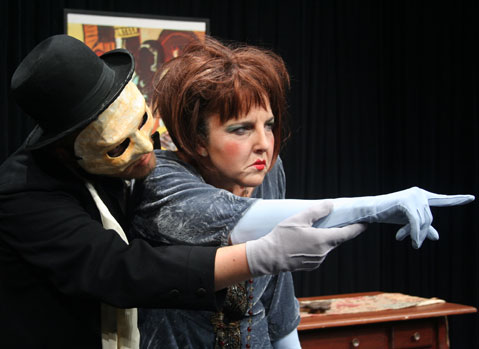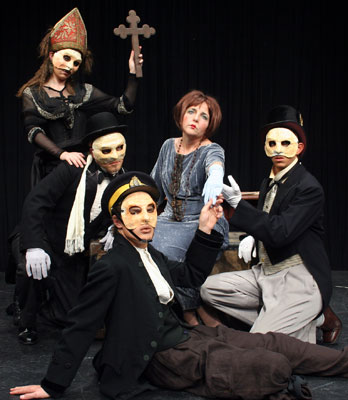Stirring the Pot at SBCC
Four Latino Dramas from the 1960s

Desperation. Vanity. Futility. Greed. Those were some of the ingredients boiling in Stirring the Pot at SBCC’s Jurkowitz Theatre. In these four one-act plays, the actors provoked their audience to feel sorry, hopeless, ironic, and pitiful. Stirring the Pot is a collection of four Latin-American plays from the late 1960s: “The Story of the Man Who Turned into a Dog” by Osvaldo Drag°n, “R.I.P.” by Jose Mart-nez Queirolo, “March” by Alberto Adellach, and “The Orgy” by Enrique Buenaventura. With the intention of inciting “political discussion and laughter,” the talented cast of mostly SBCC students adapted this Latino quartet in order to stir our own pot.

The first play was told in a flashback by three friends (Nick Smith, Tim Gibson, and Lauren Parsons). A man, brilliantly played by Alfred St. John Smith, is desperate to find a job, so he accepts the position of a watchman’s dog. He gets so used to his job that he all but transforms into a dog. Although he attempts to breakaway, he continually is pushed back into his doghouse to the point that even his wife (Parsons) fears she might give birth to a dog. The following play, “R.I.P.,” humorously spotlighted a recently deceased aristocratic couple. Simon (Alex Coleman), and his wife, Henrietta (Claudia Orona), measure their popularity by their funeral’s attendees’ social class, all the while realizing how their emptiness isn’t much different from their life.
In “March,” three actors (John DeAngelis Allen, Elijah Allan-Blitz, and Ace St. John) played more than 40 soldiers. They marched in a line and each time they questioned, thought, or doubted the reason they were there fighting, they were shot dead. Even when the three actors faced the audience and asked, “What are you gonna do when nobody goes forward?” all three were killed. Offering more props and a fuller set of actors, “The Orgy” ended Stirring the Pot. On the 30th of every month, an old woman (Jenna Scanlon) chases her mute son (Alfred St. John Smith) out of the house so she can reminisce about her past life by hiring beggars (George Coe, John Trethart, Benjamin Couch, and Claire Gordon-Harper) to act the roles of her dead lovers. “The Orgy” conveys a decadence that ultimately turns rotten.
Stirring the Pot packs humor and irony into a series of catch-22s. In each of the four dramas, the characters submit unconditionally, for the effort to breakaway from the system is hopeless.



